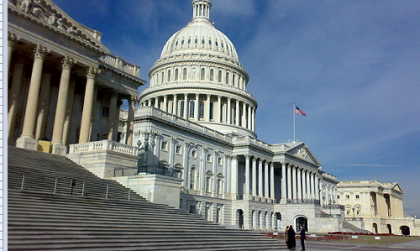New RAWA-esque Bill Introduced in U.S. House of Representatives
Possibly empowered by the election of Donald Trump and Mike Pence as the next President and Vice President of the United States, as well as the cabinet nominations that scream crony capitalism, a U.S. Representative has introduced a new anti-online gambling bill in Congress. Last Wednesday, Rep. Michael Fitzpatrick (R – PA) introduced HR 6453 in an attempt to neuter the clarification of the Wire Act issued by the Department of Justice’s Office of Legal Counsel (OLC) at the end of 2011. If the bill were to pass, it appears that all online gambling in the United States, even where it is currently legal and regulated, could disappear.

Rep. Michael Fitzpatrick (R – PA)
Photo credit: http://fitzpatrick.house.gov
As readers likely well know, Las Vegas Sands Corp. CEO Sheldon Adelson has been trying for a few years now to eliminated online gambling in the U.S. He and his supporters claim it is to protect children and problem gamblers and generally save society from itself, but really, it is because Adelson is afraid that online gambling will hurt his brick-and-mortar casino empire (never mind that most of the company’s money is made outside of the States).
It was Adelson and his team that drew up the Restoration of America’s Wire Act (RAWA), a bill that aimed to negate the OLC’s Wire Act clarification. For years, the DoJ worked under the incorrect assumption that the Wire Act made all internet gambling illegal when it specifically stated that it only applied to sports betting.* The basis of various DoJ investigations, indictments, and prosecutions, was made using a blatantly incorrect interpretation of the law.
Officials in Illinois and New York asked the Justice Department in 2009 to clarify whether or not it was ok for their states to sell lottery tickets online. Finally, in late 2010, the OLC clarified that the Wire Act only applied to sports betting. Assistant Attorney General Virginia Seitz wrote in a legal opinion that “nothing in the materials supplied by the Criminal Division suggests that the New York or Illinois lottery plans involve sports wagering, rather than garden-variety lotteries. Accordingly, we conclude that the proposed lotteries are not within the prohibitions of the Wire Act.”
This gave states the green light to regulate and legalize internet gambling, though to date, only New Jersey, Delaware, and Nevada have. A number of states, including Rep. Fitzpatrick’s Pennsylvania, are heavily considering doing the same.
Adelson and his fellow online gambling opponents were incensed at this, even though the OLC’s opinion was clearly correct. Thus, RAWA was born. Adelson got Rep. Jason Chaffetz (R – UT) and Senator Lindsey Graham (R – SC) to introduce the bill on multiple occasions, but it never gained much traction. Rep. Chaffetz even held a couple hearings, but they were seen as farces.
After a desperation attempt by Sen. Graham to force RAWA through an Appropriations Bill failed, it seemed that RAWA was pretty much did. It had little support and sneaking it through didn’t even work. But perhaps because of Trump and Pence’s impending inaugurations, anti-gambling Republicans are feeling the power again, so here we go.
HR 6453 would not explicitly make online gambling illegal. All it really says is that the OLC’s 2011 Wire Act clarification, “does not carry the force of law and shall have no force and effect for purposes of interpreting or applying section 5362(a)(10) of title 31, United States Code.”
Adelson and his cronies were REALLY pissed off that a law’s incorrect interpretation that they liked got re-interpreted by someone with legal smarts, and as such, they have taken the line that the law can’t be “changed,” even though it wasn’t actually changed, without proper debate and legislative process. Of course, that sort of process didn’t matter when it came to the UIGEA or when it came to Graham’s recent attempt to ram RAWA through Congress, but as generally seems to be the case with Republicans these days (see: North Carolina), the rules only apply to them when they want them to.
So now, Fitzpatrick’s bill is basically saying, “WAH! I don’t care if we read the rules wrong! We were winning, so the rules were right! No backsies! NOT FAIR!”
It is very likely that should this bill actually pass, that Nevada, Delaware, and New Jersey would shut down their regulated internet gambling industries and those in other states, like Pennsylvania, would be dead before they could start. Since it doesn’t explicitly make any gambling illegal, it is conceivable that there would be no changes to the current online gambling environment, but would the states want to risk running afoul of the law with the OLC’s clarification basically erased?
The text of the bill follows.
To clarify the effect of a Memorandum Opinion for the Assistant Attorney General, Criminal Division, dated September 20, 2011, and pertaining to the lawfulness of proposals by Illinois and New York to use the Internet and out-of-state transaction processors to sell lottery tickets to in-state adults, and for other purposes.
Be it enacted by the Senate and House of Representatives of the United States of America in Congress assembled,
SECTION 1. MEMORANDUM NOT TO HAVE FORCE AND EFFECT OF LAW.
The Memorandum Opinion for the Assistant Attorney General, Criminal Division, dated September 20, 2011, and pertaining to the lawfulness of proposals by Illinois and New York to use the Internet and out-of-state transaction processors to sell lottery tickets to in-state adults (including the applicability of the Wire Act (18 U.S.C. 1084) and the Unlawful Internet Gambling Enforcement Act (31 U.S.C. 5361–5367) to such proposal), does not carry the force of law and shall have no force and effect for purposes of interpreting or applying section 5362(a)(10) of title 31, United States Code.
*The Wire Act, put into effect tin 1961, didn’t actual mention the internet, as the internet wasn’t around back then. It made sports betting over telecommunications lines illegal. Over time, telecommunications lines were reasonably assumed to include the internet.



















COMMENTS